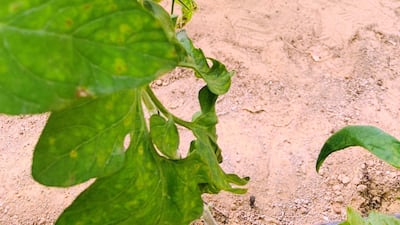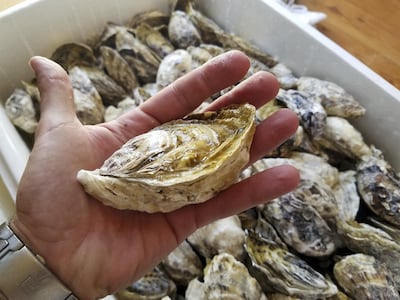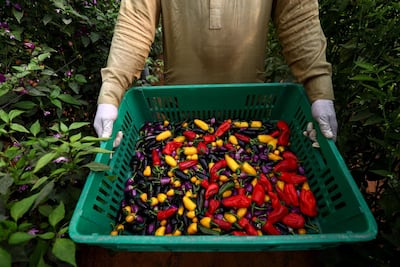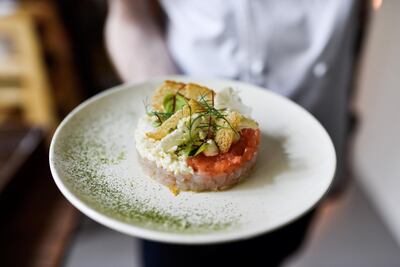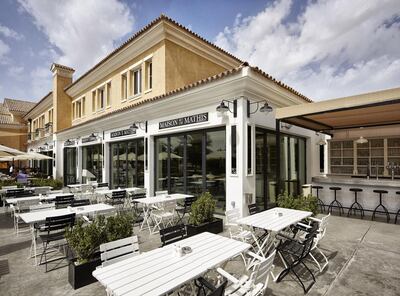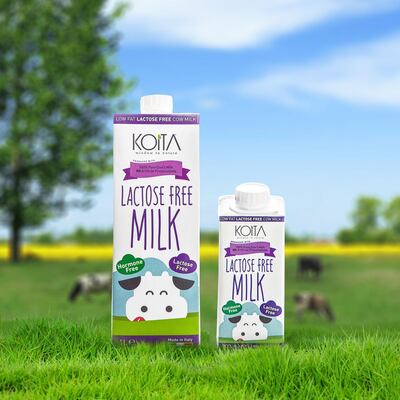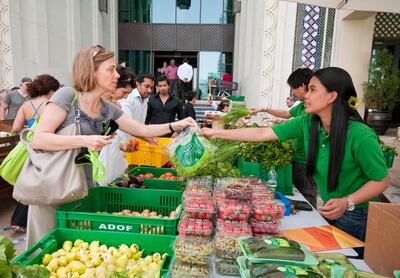What we eat affects both our health and the planet. Where food is grown, what fertilisers are used, what is fed to animals, and how food is transported and packaged, contribute to the eco footprint of what we consume. When dining out (or in, these days), why not support businesses that source sustainably? Here are a few UAE food producers to consider this Earth Day, which falls on Wednesday, April 22.
Dibba Bay Oysters
Oysters are naturally good for the environment because they are filter feeders, they improve their ecosystem by promoting eelgrass survival and denitrification for clean water. But shipping them in from afar can negate these benefits. Luckily for UAE residents, Dibba Bay does not shop far. The farm on the Gulf of Oman in Fujairah breeds commonly grown Pacific cupped oysters that are adaptable to warm temperatures. The Gulf has good temperatures, a high level of plankton and is not polluted, meaning oysters can grow quickly and are ready to eat in nine months. They are usually on the menus at The Maine Oyster Bar and Grill, Boca and Traiteur, and can be bought at Spinneys and Carrefour. You can also order Dibba Bay Oysters for delivery through Fish Box, and soon Kibsons.
Fish Farm
The company was started in 2013 with the goal of supporting local aquaculture and reducing the dependency on imported fish. It farms fresh royal sea bream, which is rich in omega-3 fatty acids; sea bass, which is an excellent source of protein and selenium; plus shrimps, hammour and more. Fish Farm products are available at Spinneys, Carrefour, Waitrose, Union Co-op and Lulu Hypermarket. The brand has also taken to sharing fish recipes on its Instagram page to help customers get through weeks of cooking at home.
Greenheart Organic Farms

Elena Kinane started farming to provide fresh produce for her friends and family, but soon saw the need for a large-scale organic project in the UAE. She launched Greenheart in 2012 and now offers countrywide delivery of more than 800 products, including about 130 varieties of heirloom vegetables.
The farm makes its own compost from animals on-site, and has developed techniques for growing better produce in the desert. Intercropping, for example, puts kale among onions, garlic and marigold, whereas sequencing places nitrogen-needy cucumbers with beans. Kinane is also bringing back heat-resilient varieties of beans, including some that were grown 2,000 years ago when irrigation and other modern techniques were not available.
About 50 per cent of Greenheart’s business comes from wholesale to restaurants and hotels, but in light of the coronavirus pandemic those sales have bottomed out, while home deliveries are up. When social-distancing restrictions are lifted, the farm will be open to customer visits.
Emirates Bio Farm
The Al Ain property, now the largest private organic farm in the UAE, was established with a clear goal: “To contribute to the establishment of a secure and sustainable food system that promotes the health of humans and environment … and provides genuine, organic food and services for conscious and healthy living.” Residents can order fresh, organic fruits and vegetables online for next-day delivery, along with home-made jams, pickles, and freshly baked breads. The farm aims to have produce on a customer’s doorstep within a day of harvest. For those who prefer to leave the orders up to the experts, there is a membership option where you can receive a box of mixed vegetables according to the season four times a month for a set fee.
Post-pandemic, Emirates Bio Farm will reopen to visitors, who can take tractor tours, experience farming, dine in the greenhouse restaurant, sip freshly pressed juices and shop for fresh produce.
Farmbox
If you are looking for a way to get all your groceries in one place, look no further than Farmbox. The company sources organic fruits, vegetables and dairy among other products, and puts them all into ready-made or selected boxes. Choose what you would like, or select a pre-made box such as the Mum’s Veggie Box. Farmbox works with farmers directly to cut out middlemen, which helps keep prices fair, and delivers as soon as possible after harvest. Many products come from the UAE or nearby countries to maintain a low carbon footprint.
Wildflower Poke & More
It’s not only where your food comes from that affects the environment, but how you eat it, too. Wildflower Poke & More was one of the first brands in the Emirates to stock reusable bamboo cutlery, straws, and reusable cups for hot and cold drinks. Last year, the brand partnered with marine conservation organisation Azraq on the #UselessUtensils campaign, to help people recycle single-use plastics.
Boca
The DIFC tapas restaurant sources 90 per cent of its seafood, and 50 per cent of its vegetables and fruits locally and regionally. For fresh fish and vegetables, Boca’s chefs visit Dubai’s Waterfront Market daily, to get hammour and sea bass from FishFarm, and oysters from Dibba Bay. Boca also works with organic and hydroponic farms across the UAE. “It has brought us closer to local farming heroes and taken us on multiple road trips discovering what very inspiring individuals have been doing in the desert,” says general manager Omar Shihab. “We were blown away by how much can be done here using new technology and techniques with absolute efficiency and minimum impact on the environment.”
The Boca menu clearly states where the food comes from, a welcome sign of transparency for guests. Behind the scenes, the kitchen makes use of the entire vegetable and animal, making stock from bones and using citrus husks for beverages, for example. They even ferment fruits and vegetables for sodas and kombucha. All of the restaurant’s waste is separated into glass, paper, plastic and cooking oil dispensers, and Boca aims to compost the one waste bag it is left with at the end of each day. Food boxes are reused as decoration, and the restaurant ditched single-use plastic utensils almost two years ago. Guests can order online for delivery until Boca reopens its dine-in service.
Seva
How meat and dairy consumption affects the environment is complicated, but the general consensus is the more plant-based your diet, the better. Seva, previously Life’n One, is Dubai’s first plant-based cafe, and is still serving up delicious salads, arepas, wraps and more. While it is best eaten on-site in the lush outdoor garden, where you can also check out the “conscious shop” and join in a yoga class, for now you can order in.
Maison Mathis
The restaurant in Arabian Ranches was revamped last year with a focus on sustainability. The restaurant only uses glass water bottles and has eliminated single-use plastic. Maison Mathis has introduced vertical farming in order to be self-sufficient and serve hyper-local produce. Food that cannot be grown on-site is sourced locally from vendors with high ethical standards. While you cannot visit the restaurant as of now, it is one to put on your list and support once eateries are allowed to reopen post-pandemic.
Koita
Mustafa Koita founded Koita Milk because he was tired of bringing organic foods back to the UAE from his hometown in the US. After speaking with other parents, he saw a need for organic milk options, so he set off in search of milk free of pesticides and antibiotics, sourced from grass-fed cows, and made with strict product regulations on farms with low environmental impact. He settled on milk from Italian cows for the taste and organic methods, but also because European farms typically use less water than artificial farms. Then, he moved on to bringing milk from Italy to the Gulf with the lowest environmental impact possible. The milk is UHT, meaning ultra high temperature or ultra high pasteurization, so it is sterilised and can be transported via sea rather than air freight, which significantly reduces its carbon footprint. It is produced under strict EU certification processes and packed in eco-friendly Tetra-Pak paper packages. Find it in most grocery stores or order directly online.
Baker and Spice
Baker and Spice launched in the UAE in 2008, and is guided by the seasons and serves only local, organic, fresh, homemade food. "Not only are we going to buy local, but we're going to encourage farmers to grow more. If the fish doesn't come from the Arabian Sea, we're not going to be using it," brand director Andre Gerschel told The National in 2018. From October to May, all vegetables come from local organic farms and customers can meet the farmers at The Farmers' Market on the Terrace, an outdoor market held every Friday and Saturday at Bay Avenue Park in Business Bay. Until further notice, dine-in locations are closed, but customers can order for delivery from the Jumeirah Town Center, Al Manzil, and Marina Promenade locations.
